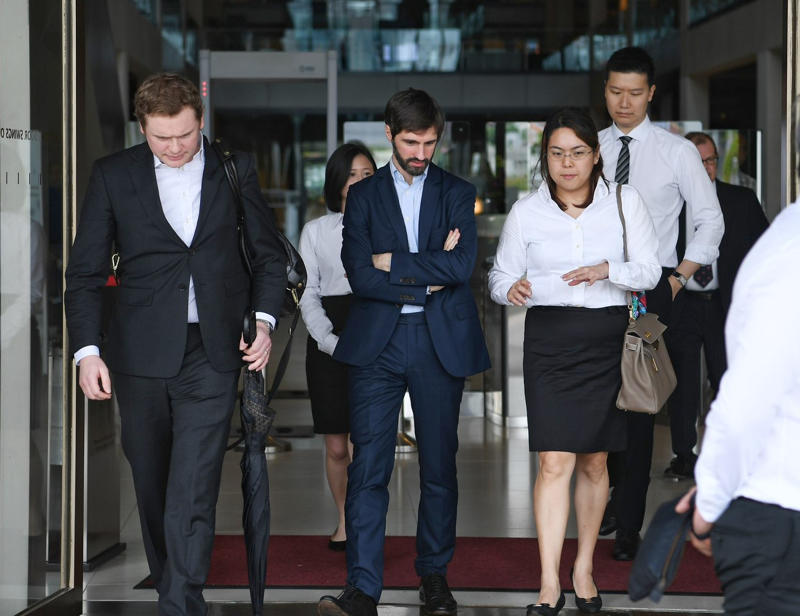Singapore's first bitcoin trial: Exchange operator found in breach of contract and trust, to pay damages
Sign up now: Get ST's newsletters delivered to your inbox

B2C2 co-founder Maxime Boonen (centre) with his lawyers at the Supreme Court on Nov 21, 2018. B2C2 had sued cryptocurrency exchange operator Quoine over trade reversals made on its platform in April 2017.
PHOTO: ST FILE
Seow Bei Yi
Follow topic:
SINGAPORE - A cryptocurrency exchange operator has been found in breach of contract and trust over a reversal of seven orders on its platform, the Singapore International Commercial Court (SICC) ruled on Thursday (March 14).
Currency exchange platform Quoine has been ordered to pay electronic market maker B2C2 damages, with the amount to be agreed on at a later date. If there is no agreement, the sum will be decided with a subsequent hearing.
The judgment comes after Singapore's first trial involving the cryptocurrency bitcoin, in which B2C2 sued Quoine over reversals made on its platform in April 2017.
B2C2 placed seven orders in April 2017 to sell the cryptocurrency ethereum for bitcoin at a rate of 10 bitcoins for one ethereum. The trades were reversed the following day.
B2C2 said the reversals were wrongful and led to proceeds being deducted without authorisation, and sought to recover around 3,085 bitcoins it lost as a result of Quoine's actions.
But even though SICC International Judge Simon Thorley ruled in B2C2's favour, he did not order Quoine to transfer the bitcoins in question.
Instead, in his judgment, he said the compelling factor against making such an order is that the transfer of bitcoin would take place at today's price.
Instead, in his judgment, he said the compelling factor against making such an order is that the transfer of bitcoin would take place at today's price.
This is "substantially higher than the price in April 2017 when the trades were executed", he added.
B2C2, represented by lawyers led by Mr Danny Ong of Rajah & Tann, had earlier argued that damages would not be an adequate remedy given the volatility of cryptocurrencies, in particular bitcoin, meaning its inherent value is hard to ascertain.
But Judge Thorley disagreed, noting: "When the bitcoin were originally credited to its account, the B2C2 software immediately began to hedge the proceeds by selling bitcoin.
"Before the trades were reversed, B2C2's systems had sold slightly under one-third of proceeds on nine different exchanges."
He was referring to B2C2's role as a market maker, meaning it buys and sells financial instruments, hoping to profit on the bid-offer spreads.
In these circumstances, the judge added, ordering a specific amount to be repaid to B2C2 "would cause substantial hardship to Quoine which any potential difficulty in assessing damages does not outweigh".
The judge, however, ruled that Quoine was in breach of contract and trust.
He noted that members' assets are held separately from that of Quoine's, and they can demand withdrawal any time. This is sufficient evidence that Quoine intended to hold the assets on trust for individual members - if Quoine was not entitled to reverse the trades, the unilateral removal of bitcoin from B2C2's account was a breach of trust.
Quoine, represented by a team led by Mr Paul Ong of Allen and Gledhill, had earlier said that a glitch in its quoter program leading up to the disputed trades had caused it to be unable to access external market price data for the two cryptocurrencies in question.
Due to the glitch, the program stopped creating or placing new orders involving these currencies on the platform, causing issues with liquidity and, therefore, problems with the orders made by B2C2 - which were priced about 250 times higher than the average price these currencies traded at on the platform.
It referred to a risk disclosure statement, saying this allowed it to cancel a transaction at an "aberrant value".
But the judgment noted that where there are contractual modifications, even if consent is not sought, there should be a notice of changes.
Noting that the contract between both parties is valid as well, "the fact that one party has made a bad bargain does not prevent the other party who has made a good bargain from keeping the fruits of the contract", said the judgment.
It added: "B2C2 was enriched because Quoine failed to take any of the steps necessary to protect itself (or others)... this is not a case of B2C2 getting an unjustified windfall, it is the inevitable result of the way the parties have chosen to trade with each other."
In a statement on Thursday, Quoine expressed disappointment at the judgement. Its chief executive Mike Kayamori said: "We are reviewing the judgment and considering our options, including the possibility of an appeal."

